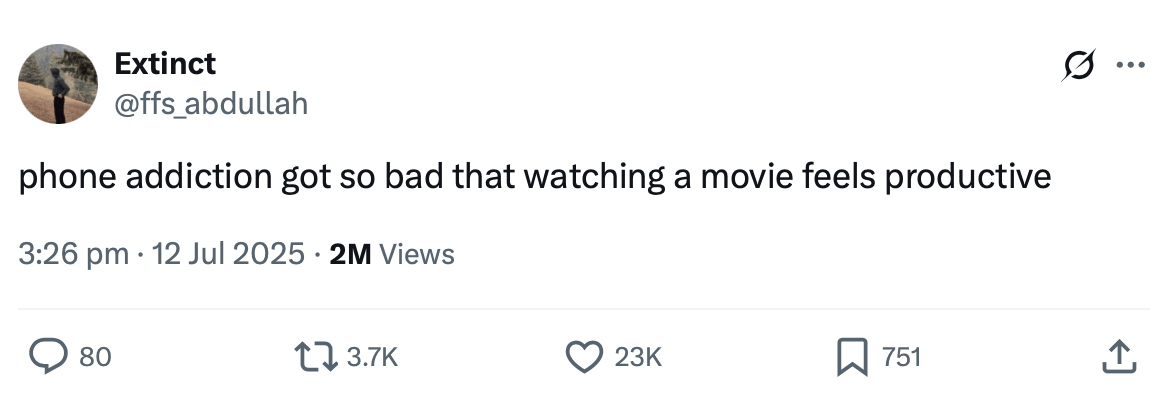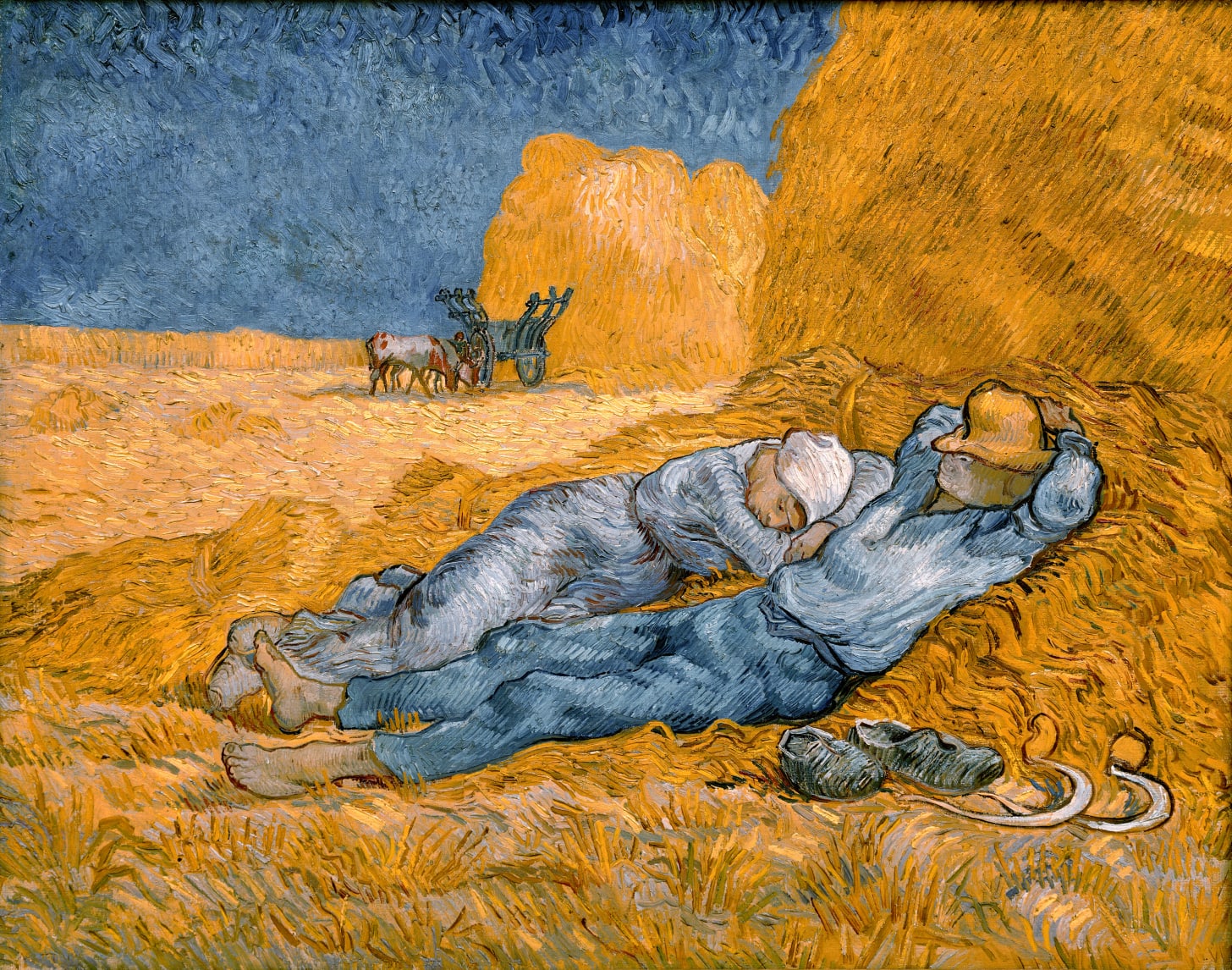In an academic assessment a few months ago, a senior tutor told me I needed to ‘slow down and pace myself’. I was ‘trying to go a little too far too fast’. My immediate response was indignant. Why would I do that? And perhaps more implicitly: How? I don’t think I know how to slow down. In my work, I am driven by one goal: productivity. How many words I’ve written in a day, how many I’ve read. How many hours I’ve worked. How many boxes I’ve ticked on my to-do list.
Sometimes I worry that I’ve turned my life into another version of that to-do list, an endless rota of tasks to be checked off rather than experiences to be lived. Go for walk: tick. Watch movie: tick. Write blogpost: tick. I’ve been tracking my daily habits since somewhere around 2016, the height of the bullet journalling craze, so a particularly intrepid archivist could create an almost decade-long map of how many mornings I’ve stretched, journaled, or walked a certain amount of steps. Why do I feel this compulsion, to track, record, and regulate each and every hour of my days, even when I don’t have work-related tasks to complete? Part of it is personality, I’m sure. I have the typical trifecta of control-obsessed mental illnesses; you can guess which. Yet there’s something social going on here too, a culture which has enabled, if not directly created, these productivity-obsessed aspects of my personality.
Last week I saw a viral Tweet which read ‘phone addiction got so bad that watching a movie feels productive’. Responses reasonably focussed on the attention span part, the way the addictive nature of the short-form video content we consume on our phones has damaged our ability to engage with longer, meaningful interactions or art-forms — a side effect of what I’ve previous termed ‘phone noise’. Yet I think the post inadvertently touched on something else, too. The obsession with ‘productivity’ is as indicative of our collective social neuroses as our fried attention spans.
‘Productivity’ is a relatively new concept, one which emerged in the nineteenth century, at the height of the Industrial Revolution. Industrial productivity was a qualitative state, but it was also quantitative, a way of measuring the effectiveness of productive effort in terms of the relationship between input and output. That calculation of inputs and outputs was integral to the rise of capitalism, an economic system centred around the pursuit of profit (one which, at least according to Max Weber, had roots in a ‘Protestant Work Ethic’ which interpreted hard-won worldly success as a sign of salvation).
The nineteenth century emphasis on productivity was a part of what Michel Foucault famously termed ‘biopolitics’, the administration of human life on both the level of the individual and the species, ‘that endeavours to administer, optimise, and multiply it’. According to Foucault, one of the poles of biopolitics is the depiction of ‘the body as a machine: its disciplining, the optimisation of its capabilities, the extortion of its forces, the parallel increase of its usefulness and its docility, its integration into systems of efficient and economic controls’. Industrial biopolitics, then, was a way of making the body productive.
Indeed, this was also the era which invented the calorie as a way of measuring not just health, but human efficiency. The caloric model of embodiment depicted the body as a functional machine and food as its fuel. In this system, the body is depicted as a combustion engine, where inputs and outputs must be adequately balanced to ensure appropriate performance. The history of the calorie is tied to the history of human labour — through Foucault’s biopolitics — in Victorian efforts to improve the diet of the poor, factory labourers, and the armies they relied on to promote imperial power across the globe. As the historian Steven Shapin writes, ‘the calorie was the vehicle for translating food powers into numbers, a way of appreciating the direct causal link between human food and the potential for human work. The nutritional calorie was not a constituent of food; it was a power that foods possessed by virtue of their constituents’. The calorie was — and still is — a biopolitical unit, a unit of productivity.
Units of productivity are not simply imposed upon us by our capitalist overlords. They provide a significant part of the structure of our lives, much as organised religion once did, from how we eat, to when we sleep, the ways we exercise, and even when we determine to have children (‘Will I have to leave my job? Can I afford it?’). They are, to paraphrase Foucault once more, part of the way in which we constitute ourselves as subjects, subjects whose lives are oriented around work, and the pursuit of individual enterprise, achievement, and growth. Perhaps the most obvious of these units are temporal: the week, day, hour, and minute, but also new, productivity-oriented ways of dividing time, like the Pomodoro Technique or ‘timeblocking’. We take these ways of structuring time as a given, particularly the 9-5, five-day working week, despite its relative novelty and despite recent evidence that a four-day week may make workers both happier and more productive.
While it can now seem oppressive, the 9-5 working day emerged in the context of Victorian campaigning for labour rights and regulations. During the nineteenth century, the working day could last up to fourteen hours in sordid conditions, with young children labouring alongside adults and little protection for factory workers operating dangerous machinery. The Welsh socialist Robert Owen coined the slogan ‘eight hours’ labour, eight hours’ recreation, eight hours’ rest’ as a call for a day structured by human needs, rather than simply the demands of capital. Owen’s slogan became central to the campaign for the shorter working week. Yet it was only in 1998 that Britain passed official legislation mandating a maximum of working hours per day — not that the law could stop the issue of overwork, now predominantly centred on the office rather than the factory floor, codified in corporate culture rather than a contractual obligation.
Today, those ‘eight hours’ labour’ are gradually creeping back into our purported ‘leisure time’, whether in the form of hour long commutes, out of hours emails, or what workplace expert Jennifer Moss terms ‘toxic productivity’, the expectation to work additional hours at the expense of leisure time, mental, and physical health. In my case, my eight hours recreation are filled with passions turned second jobs. this increasingly common kind of labour never lets you clock out; indeed, brand new research suggests 2/5 Brits have such a ‘side hustle’. Sometimes the side-hustle is performing productivity itself: Instagram and TikTok trends meticulously track how creators spend the ‘5-9’ before or after their 9-5, filling the hours with workout classes and meal prep. The sixteen hours which should facilitate Owen’s rest and recreation have instead become a new site of productivity, a space for sleepmaxxing and hitting the gym and morning routines and self-care hacks.
All of this suggests that hyperindividualised modern capitalism is no longer structured along the dual poles of home and workplace, leisure and labour. As more and more of us face precarious employment, take on casual or freelance work, gig work, multiple jobs and monetised hobbies, or even become influencers monetising every aspect of our lives, those boundaries collapse. The divide which now structures our working lives centres on the axis of productivity. Not labour versus leisure but productivity versus unproductivity. Unlike labour, productivity is not spatially or temporally oriented, bound by the hours of the 9-5 or the physical space of the office or factory. Such boundedness had already loosened over decades, with the introduction of first home laptops, then work phones, email and instant messaging, and WFH or co-working spaces. Perhaps it was in the pandemic that what was once naively termed the ‘work-life-balance’ finally collapsed.
Instead of being bound by time and space, productivity is feelings oriented. It’s hard to define exactly what counts as productive, because the answer is that which feels productive. If your attention span is fried to cinders, watching a movie — a sustained engagement with one piece of media over a longer period of time — does feel productive. Because it is feelings oriented, productivity is itself hyper-individual. It feels different for everyone — although, when we’re all consuming the same online content centred on self-optimisation, it increasingly feels the same. When you want to ‘hit your step count’, going for a walk feels productive. When you want to ‘reduce inflammation’, a six step morning routine, complete with morning yoga and lymphatic drainage massage, feels productive. When you want to ‘heal your trauma’, journalling and going to online therapy feels productive.
As these examples suggest, productivity, unlike labour, does not directly correlate with earning potential. Self-oriented work performed by and often on an individual, productivity in this new sense holds a particular place in the twenty-first century capitalist economy (an economy in which attention is a currency, and feelings are an essential tactic for grabbing that attention). Rather than being compensated with a set wage, productivity is that which could, hypothetically, be monetised within the influencer economy. Productivity, then, might ultimately boil down to doing ‘anything but scroll’. This is why watching a movie feels productive: it is doing something other than scrolling.
In the influencer economy, everything can be content except the consumption of content itself — a 5am morning routine, the tears after a bad breakup, a woman dancing on her commute (or worse, on someone else’s commute). What we do not consume is the act of consuming itself. No one monetises their internet addiction. Either it is too boring, too meta, or too off-putting; to watch a reel of someone watching reels would draw attention to the addictive, unhealthy behaviour we’re engaging in, a bit like if you could suddenly smell the breath of the sexy men and women in 1970s cigarette ads.
The act of scrolling might not be monetisable for us, the users, but it is certainly profit-generating for the Big Tech companies who package up and sell our data to advertisers, whose algorithms engage in increasingly precise micro-targeting to provide us with ever more personalised content. We are all unpaid labourers in the attention economy. No wonder we’ve become so obsessed with proving how productive we are, both on and off the screen. It’s playing the game. It’s a hustle; it’s a grind.
In this sense, personal productivity can also be a loss-maker for the individual pursing it. Much of that algorithmic micro-targeting is dedicated to selling us things — things to ‘boost’ our productivity in a particular sphere of life. A Five Minute Journal, an LED face mask, a creatine supplement. New material ways to bring meaning to our powerless lives and fill the void with feelings of productivity, even when what we’re actually doing — as when we slip into an endless doomscroll — is consuming. More of our time and more of our money is dedicated to the pursuit, not of pleasure, but of the feeling of productivity. It might just be me, but I’ve never felt that relaxed doing a sheetmask or writing down a set of affirmations. I’ve felt like I’m completing a task, like I have a goal to meet. Tick, tick, tick. I am driven not by joy but by Weber’s Work Ethic, which interprets hard-won worldly success as a sign of salvation, or perhaps by what the philosopher Bertrand Russell termed the ‘cult of efficiency’. Writing ‘In Praise of Idleness’ in 1932, Russell voiced a sentiment I am ashamed to see myself in: that ‘modern man thinks that everything ought to be done for the sake of something else, and never for its own sake’.
Maybe nothing is made and nothing is earned, but the performance of productivity accrues its own kind of social capital. To work on yourself is to care about yourself, and caring about yourself is the way to get ahead in an economic system which prioritises individual success above all else. To be someone with a 5am morning routine or a 12 step skincare routine is to be more productive, and thus morally superior. This is what Russell identified as ‘the virtue of hard work as an end in itself’. In the most extreme cases, productivity becomes nothing more than performance. Influencers rent out studios they pretend are their home or office. Ashton Hall yells ‘Yeah bro we gotta go ahead and get it to at least 10,000’ down the phone at 6am. Literature becomes a self-promotion machine where being a successful writer seems to correlate to how hot you are online and how many parties you get invited to.
If everything is productive except for scrolling, what is happening to our leisure time? I’ve been thinking about this a lot lately, as tech companies continue to promote the disingenuous claim that once AI has made us all redundant we’ll have loads of time for leisure. What they mean by this, of course, is that we’ll have loads of time to scroll through our phones, lapping up the slop sloshed into our feeds by the algorithm, and therefore generating even more profit for those same tech companies which made us redundant in the first place. A bit like factory farm cows, we’ll be mentally and physically flabby, but hey, anything for profit! (Perhaps those of us with a certain level of wealth or a particular skill or attractive face will find a way to carry on, becoming ‘content creators’ rather than simply content consumers.) This is very different to the sort of restful yet directed leisure of say, painting, going on a hike, seeing a movie, or visiting a museum. It is different also from the once-common form of leisure which involved affordable, accessible third spaces like the sports club or the library. Instead, it is almost entirely passive, and directed by algorithm. The ‘right to rest and leisure’ enshrined in the UN’s Universal Declaration of Human Rights faces a new challenge, not just from a culture of overwork, but from the vanishing of meaningful leisure altogether.
‘Unproductivity’ does not, like ‘leisure’, imply rest, entertainment, self-development, pleasure. Instead it is a negation, a state which always implies the superiority of its opposite, and our failure to attain it. It is ‘not work’, ‘not labour’, ‘not productive’. The discourses of unproductivity operate from the top of the economy to the bottom. They lead to both executive burnout and the punitive emphasis on ‘performance’ in Amazon warehouses, where workers even have their bathroom breaks timed. They lead also to bedrot, to brainrot, to burnout, to the doomscroll. Feelings of unproductivity, and thus feelings of failure. It is these sensations of doom or rot which we are striving to avoid when we turn every second of our lives into a quest for productivity. Productivity is busywork. It passes the time. It keeps us moving, keeps us working, stops us from slowing down and looking at the world around us and really thinking. It is another expression of our cultural unease with silence and stillness, the lo-fi beatsification of our collective background noise. In the crudest cod-Marxist sense, productivity prevents us from seeing the conditions of our own exploitation.
For Russell, writing in 1932, the obsession with work was not only unhealthy but ultimately pointless. Technology and the principles of scientific organisation meant that there was no reason to keep working so hard, ‘no longer any reason why the bulk of the population should suffer this deprivation [from leisure]; only a foolish asceticism, usually vicarious, makes us insist on work in excessive quantities now that the need no longer exists’. A four hour working day would suffice, providing the opportunity for all to live a ‘happy life’. Russell wrote this nearly a century before the introduction of AI, now in the process of displacing and automating much of the workforce. (‘If you want to do a job that’s kinda like a hobby, you can do a job’, Elon Musk said last year: ‘otherwise, AI and the robots will provide any goods and services that you want’). To the optimist, or to someone with absolutely no knowledge of the character and history of Elon Musk, this might suggest an Edenic utopia, the fulfilment of Russell’s vision of ‘happiness and joy of life, instead of frayed nerves, weariness, and dyspepsia’, or even Marx’s ‘From each according to his ability, to each according to his needs’.
Yet not only are we all working more, rather than less, and earning less for doing it, it is increasingly difficult to access leisure in the sense championed by Russell. Russell’s leisure is a kind of active ‘idleness’, that ‘universal source of happiness’ to which all deserve to stake a claim. This is very far from passive scrolling. When it is not taken up with aping productivity or striving to monetise our every second, our leisure time is consumed by consumption: both material consumption, and the consumption of online content, which is usually designed to sell us something, whether an object or a lifestyle to aspire to. In the attention economy, labour has become an expression of our selves and leisure has become the way those aspirational selves are formed, turning leisure into a type of self-making labour, another means by which the individual is made ‘productive’ in the global capitalist system.
Musk insists that in the future, ‘probably none of us will have a job’. Yet I am scared we are accelarating towards a different vision of the future. One which does not offer the promise, as well as the problems, of the ‘end of work’, but something entirely more sinister: the end of leisure.
Congrats if you made it this far; I fear it was dense. This essay is a partial articulation of something I’m hoping to keep working on about tech, leisure, and labour, so let me know what you thought.
.png)





